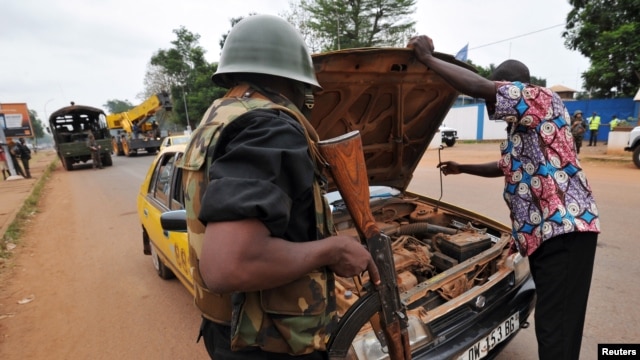
A gendarme checks a driver's car at a checkpoint in the PK4 district of Bangui, Feb. 27, 2014.
GENEVA — A senior U.N. refugee official says more massacres of civilians in the Central African Republic are inevitable without an increase in international forces.
Returning from a two-month stay in the conflict-ridden country, UNHCR's Philippe Leclerc, who is in charge of protection for the United Nations system in Central African Republic, says anti-Muslim feelings are running high and that both political mediation and increased troop strength are needed to protect civilians.
After attempting to organize a plan to protect civilians nationwide, Leclerc says although there are a number of communities throughout the country where Christians and Muslims continue to live peacefully side-by-side, the state lacks adequate policing and judicial resources to protect its own citizens.
“If there were more international forces, there will be less human rights violations and less reasons for people to flee either internally or abroad," he said. "It is extremely important that both international forces as well as political efforts are made to resolve and to prevent these massacres. I would also highlight the political dimension and the mediation part in many parts of the country, which still can work and avoid massacres.”
The Seleka, a mostly Muslim rebel group, seized power from the Christian-dominated government of Francois Bozize nearly a year ago. The Seleka proceeded to rape, pillage and kill many Christians in the ensuing months, sparking the rise of defense groups known as anti-Balaka, or "machete proof."
Now the tables are turned and the Christian rebel groups are wreaking revenge upon the Muslim population. Leclerc says the "cleansing" of Muslim civilians is occurring in western and northern parts of the country, and that many people are willing to escape abroad but cannot find a safe passage.
UNHCR estimates the number of people displaced within the Central African Republic because of the ongoing crisis at 700,000. It reports close to 290,000 people have fled to the neighboring Democratic Republic of Congo, the Republic of Congo, Chad and Cameroon. |
|
